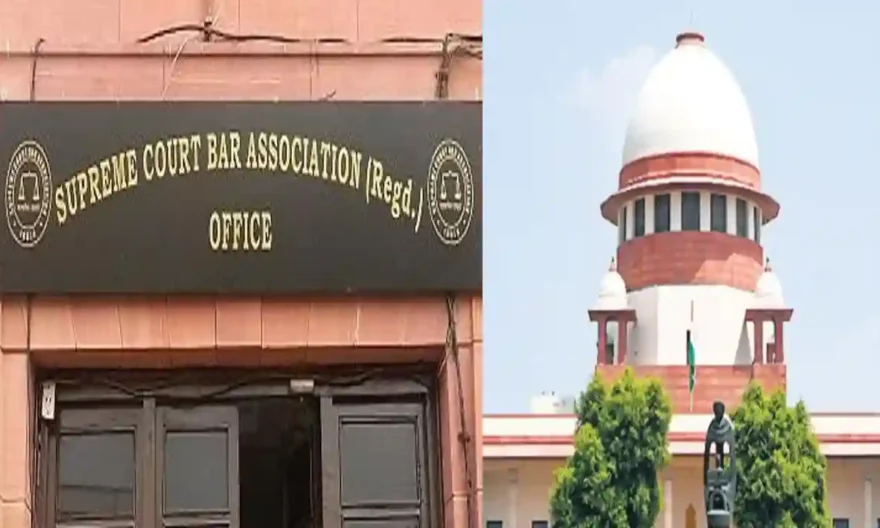
The Supreme Court Bar Association (SCBA) recently opposed the Central Government’s modification application in the matter of the rules for the designation of Senior Advocates as laid out by the Supreme Court’s 2017 judgement in Ms Indira Jaising v. Supreme Court of India.
The matter is set for further hearing on 22nd February, 2023.
The SCBA highlighted that only Constitutional courts can deal with the legal profession’s designation process, and that bar associations have a say in ensuring that the proper criteria are followed to confer the senior gown on deserving lawyers.
The SCBA stated, “The Union of India or the state governments, as litigants before the Court, have no locus standi in the matter and thus have no right to suggest anything in the matter of senior designation. The Union of India or the State has no role to play and thus no stakes in the matter of senior designation, and thus their application suggesting changes to the procedure must be rejected.”
The association expressed concern that the final round of the Supreme Court-initiated senior designation process has yet to be completed. The Supreme Court issued its most recent notice inviting applications for senior designations in February 2022, according to the SCBA.
The Supreme Court is currently hearing several petitions sought immediate designation of Senior Advocates in the Supreme Court and High Courts. SCBA filed an application in that matter.
Other suggestions made by the SCBA include eliminating the weightage given to interviews and publications by aspirant-advocates.
The SCBA submitted, “Giving 15 points for publications may not be desirable because few actively practising Advocates have time to write books and articles. In any case, writing books and articles does not improve an advocate’s advocacy skills in any way, and it is difficult to determine whether the article was written by the Advocate himself. This criterion has no relevance to the goal of determining the suitability of a candidate for designation. Furthermore, there are no objective criteria for awarding publication points.”
The association argued that evaluating candidates for senior positions is a continuous process that takes place over a long period of time. As a result, their suitability cannot be determined by a single interview, according to the SCBA.
In addition, the SCBA requested leniency for advocates with more than 30 years of experience in the higher judiciary when evaluating them under the Senior designation Rules.
“The rigours of selection specified in this Hon’ble Court’s judgement in Indira Jaising v. Supreme Court of India [reported as (2017) 9 SCC 766] should apply only to lawyers with less than 30 years of practise in this Court,” the SCBA proposed.
Furthermore, the SCBA stated that the experience of counsel at various fora, including tribunals, should be considered in order to promote diversity.
The SCBA also suggested that the top court consider the disparity in the number of appearances by counsel who appear for the government versus those who do not.
“Advocates representing various governments have a large number of appearances, many of which are ineffective hearings, whereas private lawyers face a disadvantage in terms of the number of such appearances,” the SCBA highlighted.
The SCBA also argued that the rule requiring judges to vote by secret ballot deserves to be retained.
Senior Advocate and SCBA President Vikas Singh settled the SCBA’s application, which was filed through advocate Yugandhara Pawar Jha.
The SCBA filed the current application after the Central Government recently filed a modification application in the matter.
The Central government argued in its application that the new system, established after the Indira Jaising ruling, had resulted in a “dilution” of the esteem, elegance, and dignity associated with the process of conferring designations.
As a result, the Centre has advocated for a return to the old system of performance-based evaluation by full courts followed by a secret ballot vote.
The Centre also complained about the weightage given to publications and interviews of aspirants for designation. The practise of applying and campaigning was also highlighted.
Notably, the concluding paragraph of the 2017 Indira Jaising judgement acknowledged that the framework established by the judgement was not exhaustive and might need to be revisited based on experience gained over time.
On February 16, a Bench of Justices Sanjay Kishan Kaul, Manoj Misra, and Aravind Kumar stated that different issues may arise in different High Courts, but that the issues arising from the judgment’s concluding paragraph would be addressed first.
Another application in the matter was previously filed by the Supreme Court Advocate-on-Record Association (SCAORA), which sought directions to expedite the process of designating Senior Advocates to the Supreme Court, despite the fact that applications for the same were last invited in February 2022.
According to the SCAORA application, the top court’s Committee for Designation of Senior Advocates (CDSA) was required to meet at least twice a year under the 2017 judgement. However, it was highlighted that after 2019, the next round of applications was sought only in February 2022, and the latter has yet to be completed.




